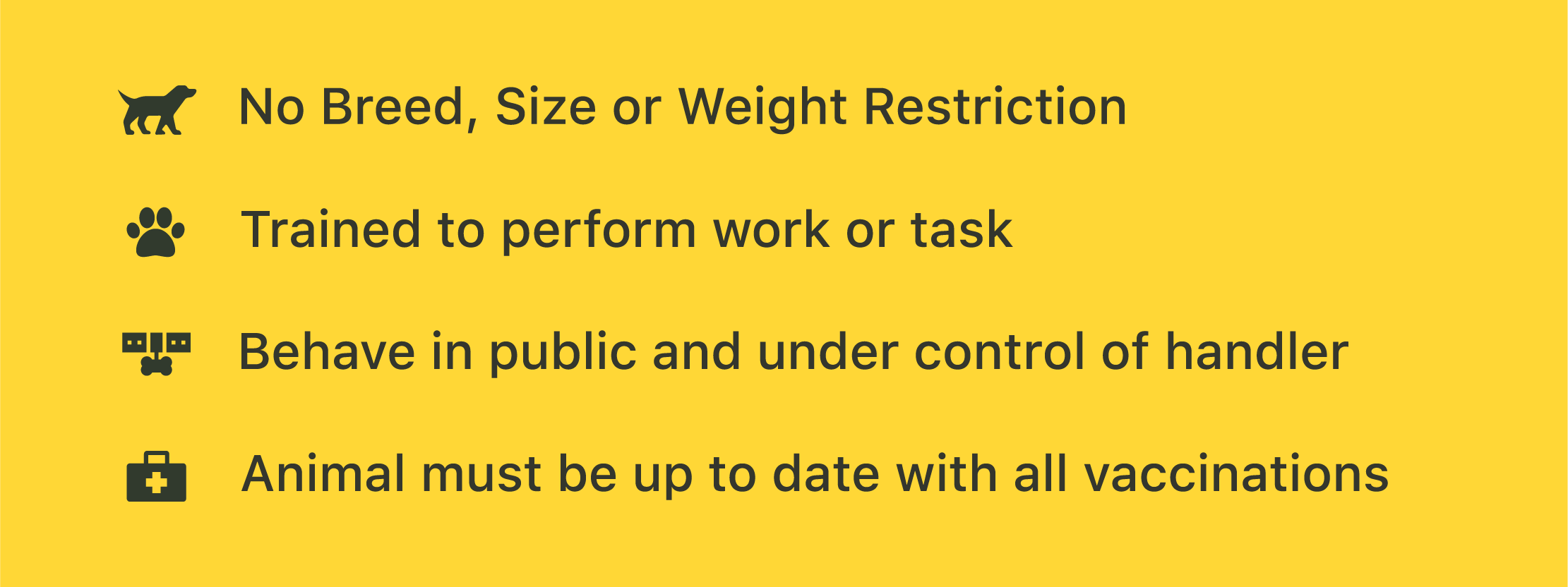 Certified Course
Certified Course  Accredited Course
Accredited Course  Accepted by Airlines
Accepted by Airlines● Understand Your Puppy’s Behavior;
● Form A Strong Bond with Your Dog;
● Public Access Manners;
● Deep Pressure Therapy for Calming Effect;
● Tactile Stimulation to Disrupt the Overload;
● Crowd Control, Panic Prevention in Public;
● Airport Manners
● Assistance in Crisis
Find the complete learning plan in the Syllabus below.
Special Enrollment Price
Originally: $798
Now Only: $429
Save $369 Today


Money back guarantee within 14 days*

Are you looking to train your own puppy to become a psychiatric service dog? If you have answered yes, our Bundle will provide you with valuable tips on how to train your puppy to become a psychiatric service dog, as successful early training and bonding will make later service dog training much simpler.
The Intensive Psychiatric Service Dog Training Course and the Service Puppy Training Program are a combo for owners who are adopting a puppy in order to train them to become a psychiatric service dog.
Our courses are developed by the SDTSI team of trusted, experienced behavioral experts, including certified trainers and board-certified veterinary behaviorists. The programs will help you build a solid foundation and gain a better understanding of your dog as an individual, his/her body language, strengths, weaknesses, as well as of your own needs. You and your paw friend will be able to spend valuable time together and strengthen your bond. Having the feeling that you are the only one who is in control of your own life can not be compared with anything else!
The Service Puppy Training Program is divided into 5 modules, designed to prepare your service dog puppy for basic obedience tasks. The PSD course is spread over 6 distinct modules, covering everything you need to learn about training a service dog for PTSD, Panic Disorder, Anxiety, and Depression, and being a service dog handler.
If you want us to be a part of your training journey, you can participate in our training program by following three easy steps: Enroll, Study, and Get Certified. There are no long waiting lists or periods to sweat out!
Sign up and get started today; you'll be amazed at what you and your dog can achieve!
Individuals who suffer from mental illnesses such as PTSD, Panic Disorder, Anxiety, Depression, Mental Abuse, etc., who are in the process of training their own pet dog to become a service dog to deal with their psychiatric disabilities, or who are planning to adopt or pick out a dog and train them to become a psychiatric service dog in the near future.
We generally recommend psychiatric service dogs be owner-trained with professional guidance from our tutor trainer, because psychiatric service dogs need to establish a particular bond with the user to most effectively mitigate disabling symptoms. Being in contact with the dog makes it possible for the dog to learn to recognize (and then respond to) departures from an individual’s baseline emotional or physiological state.
A psychiatric Service Dog is a dog of any breed or size, trained specifically to do work or tasks to assist with a person’s mental health disability, and prepared to behave in public. PSDs are trained to assist in medical crises and provide treatment and security to their owners, including managing anxiety and panic attacks and preventing their handlers from reacting unfavorably in stressful situations.
To qualify for a service dog, an individual must have a physical or mental impairment that substantially limits one or more major life activities. Psychiatric Service Dogs (PSDs) are specially trained dogs that help people with psychiatric or mental health problems.
PSDs can be trained to do a variety of work and tasks to suit the individual needs of the disabled partner. Tasks are intentionally requested by the handler, such as turning on the lights or doing a non-aggressive room sweep. Work is not intentionally requested by the handler, but is available when the dog is cued by the environment or changes in the person's body. One example of work includes alerting to an oncoming panic attack so the handler can take medication or exit the situation. Another work example includes hallucination discernment, where the PSD is trained to non-aggressively react to cues in the environment so the handler can know when what they see is real or a hallucination. Sometimes the line between work and tasks isn't clear, but what's important is the person gets needed help. Some dogs can be trained to guide the handler to a safe location on command (guiding can require independent reactions to the outside world), which can help a person who sometimes becomes cognitively impaired and has difficulty navigating. The types of assistance are as varied as the people who need them!
You can get a PSD from the programs that specialize in training PSD dogs and have the specific requirements they have for applicants, which can be expensive and the waiting lists for a perfect match can be as long as years.
You can also train your own PSD. If you already have a dog that you want to train to become a service animal, it makes sense financially and in terms of time that you train your own service dog with the help of specific instructions.
Properly training your dog to be a service dog takes about six months to a year, but with the help of SDTSI and our professional trainer tutor, you can usually do it in less time. PSD dogs are trained both privately with the handler he will assist and publicly to ensure he is comfortable and obedient around people.
Yes, if the local law requires pet dogs to be licensed and registered, then psychiatric service dogs must be as well. Local law requiring vaccinations for pets also applies to service animals.
Generally, service animals must be allowed to accompany their handlers in all areas that members of the public may go. A handler is entitled to bring their service animal into these areas even if it won’t perform its service during the visit. Service animals may be excluded from certain areas of an otherwise public-serving facility. To learn more, please go to Frequently Asked Questions about Service Animals and the ADA.
be in possession of a very well-behaved service dog and your dog partner will be Certified as a Service Dog with all the training records by SERVICEDOG TRAINING SCHOOL INTERNATIONAL. A digital copy of the certificate will be delivered to your email inbox within 24 hours.
To view a sample of the award, please click here.
It means your dog has been trained to perform the work or tasks as a psychiatric service dog.
The primary purpose of certification is to ensure that your dog is fully trained and able to perform psychiatric service dog work and that you, the handler, understand how to lead your Assistance Dog/Service Dog through everyday situations, such as going to a store, a park, a hospital, a care home or any other public place.
◉ Airlines are permitted to deny transport to a service dog if it:
○ Violates safety requirements - e.g., too large or heavy to be accommodated in the cabin;
○ Poses a direct threat to the health or safety of others;
○ Causes a significant disruption in the cabin or at airport gate areas; or
○ Violates health requirements - e.g., prohibited from entering a U.S. territory or foreign country.
◉ Airlines are permitted to deny transport to a service dog if the service dog user/handler is unable to explain what specific work or task the dog has been trained to do. Personal information about the individual's disability can not be required.
◉ Airlines may deny transport to a service dog that is accompanying a person with a disability if a Department of Transportation (DOT) service animal form is required, but it has not been completed and submitted by the service dog handler/user in a timely manner.
This form is essential in providing the airline with information about the service animal, such as its age, size, breed, and behavior, as well as details about the handler/user.
Upon completion of this Certified Intensive Service Dog Course, you will receive a training certificate as proof of your dog's legitimacy and will also be eligible for our Air Travel Training Program.
Our team will be by your side to help you prepare the service animal air transportation form and other documentation that may be required.
Emotional Support Animals are not allowed to fly in the passenger cabin free of charge. You can find more information in our article New 2023 Rules and Restriction for Flying with Service Dogs (and ESA).
- Things to Consider When Before Getting a Puppy
- Understand Your Puppy
- Body Language Dictionary
- Dog Psychology
- Social Behavior
- Dog Senses
- Puppy Cares and Nutrition
- Top Dangerous Food for Dogs
- DIY Dog Food From SDTSI Certified Pet Food Nutrition Specialist
- Potty Training
- First 5 Steps to Train Your Service Dog Puppy
- Build Puppy Confidence and Further Training Examples
- Starting a Schedule for Your Puppy
- 5 Puppy Daily Routine Elements to Consider
- Example Puppy Daily Schedule Chart
- Dealing with Behavioral Issues
Conclusion
1 - Introduction
2 - Handler’s Job and Responsibilities
3 - Abilities and Limitations of Your Psychiatric Service Dog
4 - Understand Your Dog Partner
5 - Psychiatric Service Dog Candidates
6 - Calculations For Homemade Dog Food
7 - Human Foods That Are Safe For Dogs
8 - Which Food Can Harm Your Dogs?
9 - Basic Commands to Teach
10 - Eye Contact Training
11 - Focus Training
12 - Bark Training
13 - Advanced Training Skills
14 - Specialized Training to Mitigate Symptoms
15 - Step-By-Step Training for PTSD
16 - Alert Tasks for Psychiatric Conditions
17 - Psychiatric Tasks List
18 - Public Access Test - Exam For the Team
19 - Aircraft Training
At the end of each training session, our tutor team will conduct an online evaluation of your training progress. You will be asked to complete a quiz and submit photos and videos of your dog performing specific tasks and exhibiting proper public behaviors. This method of continual assessment ensures that your personal trainer can consistently monitor your training progress, provide you with assistance throughout the course, and prepare you for final certification and public testing.
All study materials
⊛ 12 lessons
⊛ 20 videos
⊛ 12 exams
⊛ 9hrs 29m time to complete
⊛ Certificate upon completion
Study and Training Guide
Full Tutor and Admin support
The course fee includes the printable service dog certificate. The digital copy will be sent within 24 hours upon successful course completion.